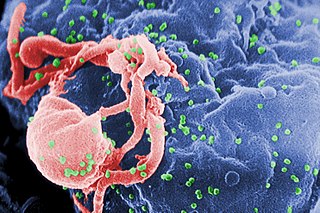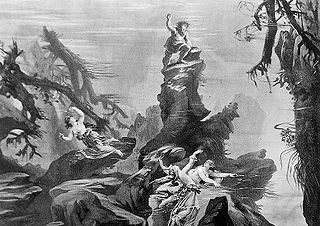Related Research Articles

The human immunodeficiency viruses (HIV) are two species of Lentivirus that infect humans. Over time, they cause acquired immunodeficiency syndrome (AIDS), a condition in which progressive failure of the immune system allows life-threatening opportunistic infections and cancers to thrive. Without treatment, average survival time after infection with HIV is estimated to be 9 to 11 years, depending on the HIV subtype.

Der Ring des Nibelungen, WWV 86, is a cycle of four German-language epic music dramas composed by Richard Wagner. The works are based loosely on characters from Germanic heroic legend, namely Norse legendary sagas and the Nibelungenlied. The composer termed the cycle a "Bühnenfestspiel", structured in three days preceded by a Vorabend. It is often referred to as the Ring cycle, Wagner's Ring, or simply The Ring.

Zidovudine (ZDV), also known as azidothymidine (AZT), is an antiretroviral medication used to prevent and treat HIV/AIDS. It is generally recommended for use in combination with other antiretrovirals. It may be used to prevent mother-to-child spread during birth or after a needlestick injury or other potential exposure. It is sold both by itself and together as lamivudine/zidovudine and abacavir/lamivudine/zidovudine. It can be used by mouth or by slow injection into a vein.

Satyagraha is a 1979 opera in three acts for orchestra, chorus and soloists, composed by Philip Glass, with a libretto by Glass and Constance DeJong.
Constantine Koukias is a Tasmanian composer and opera director of Greek ancestry based in Amsterdam, where he is known by his Greek name of Konstantin Koukias. He is the co-founder and artistic director of IHOS Music Theatre and Opera, which was established in 1990 in Tasmania's capital city, Hobart.
The Gay Men's Chorus of Los Angeles (GMCLA) is an amateur choral group composed of gay men from the Los Angeles area. Since 1979, GMCLA has grown in size, gained professional artistic and administrative staff, toured nationally and internationally, released 16 CDs, and appeared with numerous stage, film, and television celebrities including Billy Porter, Lily Tomlin, Angela Lansbury, Bea Arthur, Malcolm Gets, Doris Roberts, Jerry Herman, Melissa Manchester, Mary McDonnell, Levi Kreis, Joanna Gleason, Alex Newell, Amber Riley, Charles Pierce, Miss Coco Peru, Valarie Pettiford, Jane Lanier, Randi Driscoll, Margaret Cho, Michael Jeter, Stephen Schwartz, Liz Callaway, Lance Bass, Jennifer Holliday, Tierney Sutton, and LeAnn Rimes. The Chorus has appeared on several television broadcasts including the 85th Academy Awards, Access Hollywood, Will & Grace, $#*! My Dad Says, The Ren & Stimpy Show, Mad TV, and a six-episode arc on Six Feet Under.

The Greek National Opera is the country's state lyric opera company, located in the Stavros Niarchos Foundation Cultural Center at the south suburb of Athens, Kallithea. It is a public corporation under the supervision of the Greek Ministry of Culture and administered by the Board of Trustees and its Artistic Director, currently George Koumedakis.

Human immunodeficiency virus infection and acquired immunodeficiency syndrome (HIV/AIDS) is a spectrum of conditions caused by infection with the human immunodeficiency virus (HIV), a retrovirus. Following initial infection an individual may not notice any symptoms, or may experience a brief period of influenza-like illness. Typically, this is followed by a prolonged incubation period with no symptoms. If the infection progresses, it interferes more with the immune system, increasing the risk of developing common infections such as tuberculosis, as well as other opportunistic infections, and tumors which are otherwise rare in people who have normal immune function. These late symptoms of infection are referred to as acquired immunodeficiency syndrome (AIDS). This stage is often also associated with unintended weight loss.
Chamber Made, formerly known as Chamber Made Opera, is an Australian arts organisation based in Melbourne, creating work operating at the intersections of music, sound and contemporary performance.

Steve Schalchlin is an American songwriter, actor and musician. He is widely regarded as one of the first HIV/AIDS bloggers, beginning his in 1996 to keep family and friends updated on his failing health. When he responded well to a last-ditch effort in treatment by his doctor, he found out that his little "AIDS blog" had garnered a net following. A respected songwriter, Steve put his rebound into music that his partner, playwright Jim Brochu, turned into the critically acclaimed The Last Session.

And the Band Played On is a 1993 American television film docudrama directed by Roger Spottiswoode. The teleplay by Arnold Schulman is based on the best-selling 1987 non-fiction book And the Band Played On: Politics, People, and the AIDS Epidemic by Randy Shilts, and is noteworthy for featuring both a vast historical scope, as well as an exceptionally sprawling cast.
The State Theatre Company of South Australia (STCSA), branded State Theatre Company South Australia, formerly the South Australian Theatre Company (SATC), is South Australia's leading professional theatre company, and a statutory corporation. It was established as the official state theatre company by the State Theatre Company of South Australia Act 1972, on the initiative of Premier Don Dunstan.
Days and Nights with Christ is the first of five full-scale operas by the Constantine Koukias a Tasmanian composer and opera director of Greek ancestry based in Amsterdam, where he is known by his Greek name of Konstantin Koukias. This was the first opera / music theatre production by IHOS Experimental Theatre Troupe. It premiered at Hobart's Salamanca Arts Festival in 1990 and two years later was a highlight of the Festival of Sydney. The work, which explores images associated with schizophrenia, was inspired by the experiences of the composer's brother and by their shared Greek heritage.
To Traverse Water is an opera by Constantine Koukias a Tasmanian composer and opera director of Greek ancestry based in Amsterdam, where he is known by his Greek name of Konstantin Koukias. The opera depicts a young Greek woman's departure for Australia and her settlement there. Her tale is loosely based on that of Koukias’ mother, and the opera makes direct reference to her at the end of the show when a slide picture of her appears, along with a tape of her voice intoning an old village song.
Tesla – Lightning in His Hand is a large-scale opera about Serbian American engineer and inventor Nikola Tesla (1856–1943), composed by Constantine Koukias, a Tasmanian composer and opera director of Greek ancestry based in Amsterdam, where he is known by his Greek name of Konstantin Koukias, with libretto by Marianne Fisher.
The Lunch Box is a chamber opera by Thai composer Thanapoom Sirichang and Thai librettist Bringkop Vora-Urai. Composed entirely in Tasmania under the guidance of IHOS Artistic Director Constantine Koukias, The Lunch Box may be the first opera sung in Thai to blend traditional Thai music and contemporary Western opera.
The Divine Kiss — The Evil is Always and Everywhere is an opera by Constantine Koukias a Tasmanian composer and opera director of Greek ancestry based in Amsterdam, where he is known by his Greek name of Konstantin Koukias. The opera explores the imagery of the seven saving virtues: prudence, justice, fortitude, temperance, faith, hope and charity.
IHOS Music Theatre and Opera is a Tasmanian opera company was established in Hobart in 1990, by composer and artistic director Constantine Koukias, and production director Werner Ihlenfeld to create original music-theatre and opera works.

Edinburgh Grand Opera is Scotland's oldest existing grand opera company, founded in 1955 by Richard Telfer. This Edinburgh Music Society is run by its non-professional chorus with advice and support from the professional Artistic and Musical Directors and Designers it engages. It was originally known as the Edinburgh Grand Opera Group, and it has also been referred to as Edinburgh Grand Opera Company. Its soloists are a mixture of amateur, semi-professional and professional singers from Scotland and abroad, many of whom are students or graduates from the Royal Conservatoire of Scotland. It was the first amateur company to perform at the Edinburgh Festival Theatre.

Julio and Marisol was a bilingual (English/Spanish) public-service advertising campaign that ran in the New York City Subway, promoting condom use to prevent AIDS. The well-known catchphrase was a line from the first installment, in which Marisol sobs, "I love you, but not enough to die for you".
References
- ↑ Shevtsova, Maria 1996, "Greek Australian Odysseys in a Multicultural World", A Journal of Performance and Art, January 1996, vol 18 no. 1
- ↑ Gallasch, Keith 1994, "Microscopic Epic", RealTime vol. 26, October–November 1994
- ↑ MIKROVION Program 1994
- ↑ Koukias, Constantine, in Gallasch 1994, op. cit.,
- ↑ Wood, Danielle 1994, "Striking opera flows from tear-drop images", The Mercury, 29 September 1994, p. 28
- ↑ Westwood, Matthew 1995, "Small life, big message", The Weekend Australian Review, 11–12 February 1995